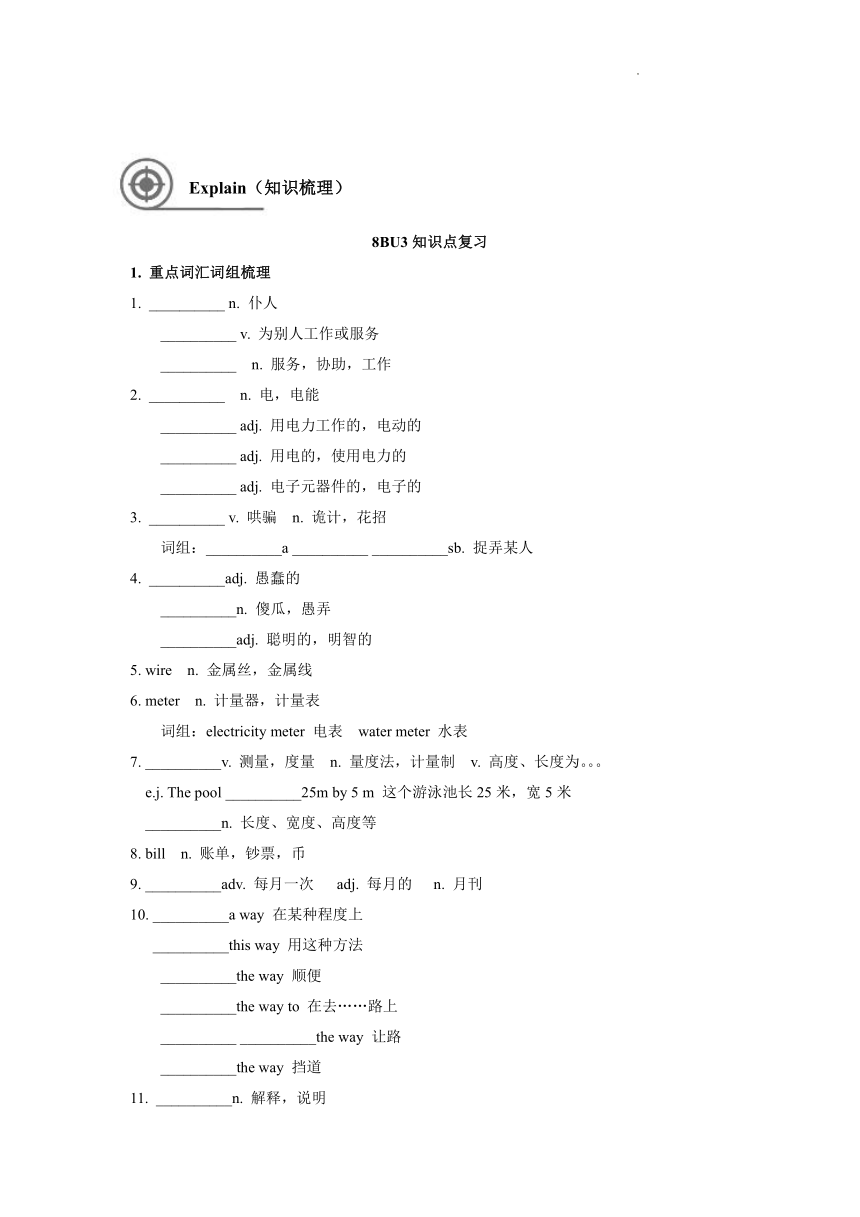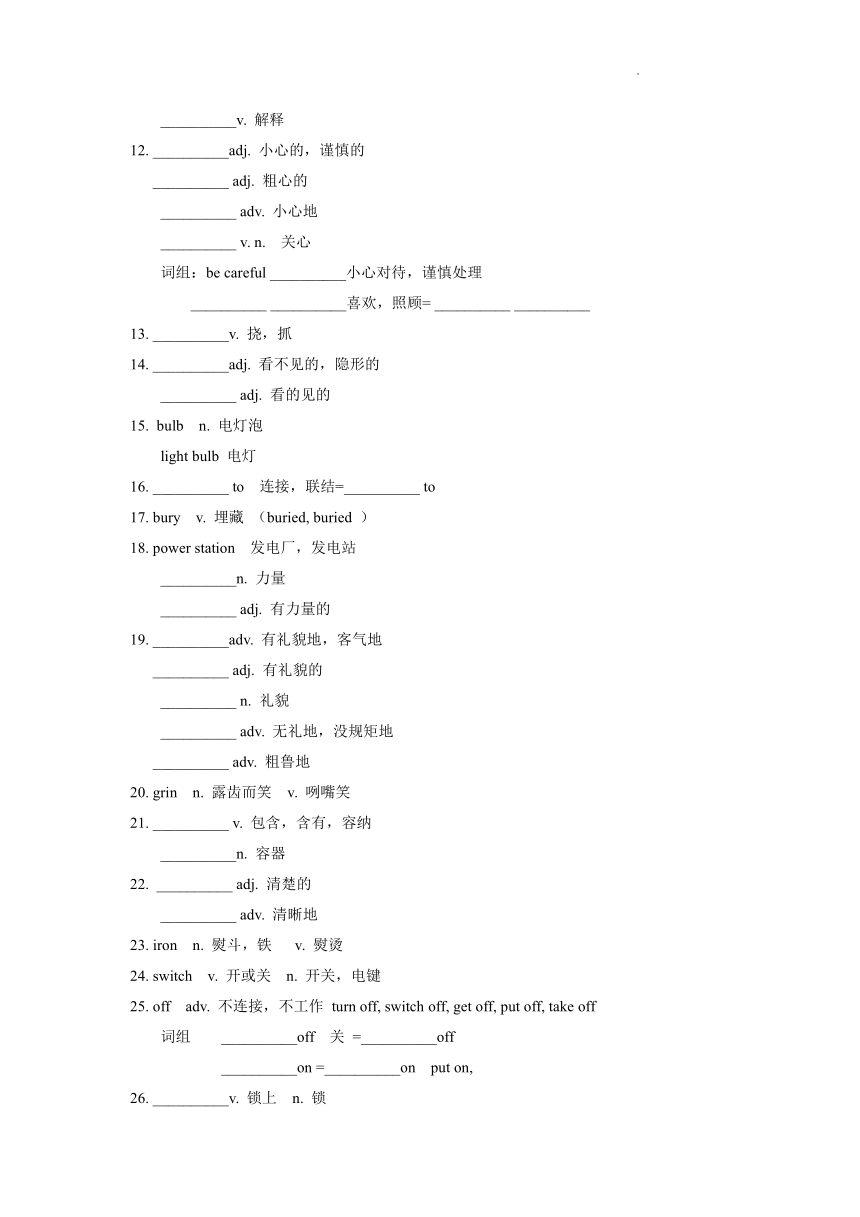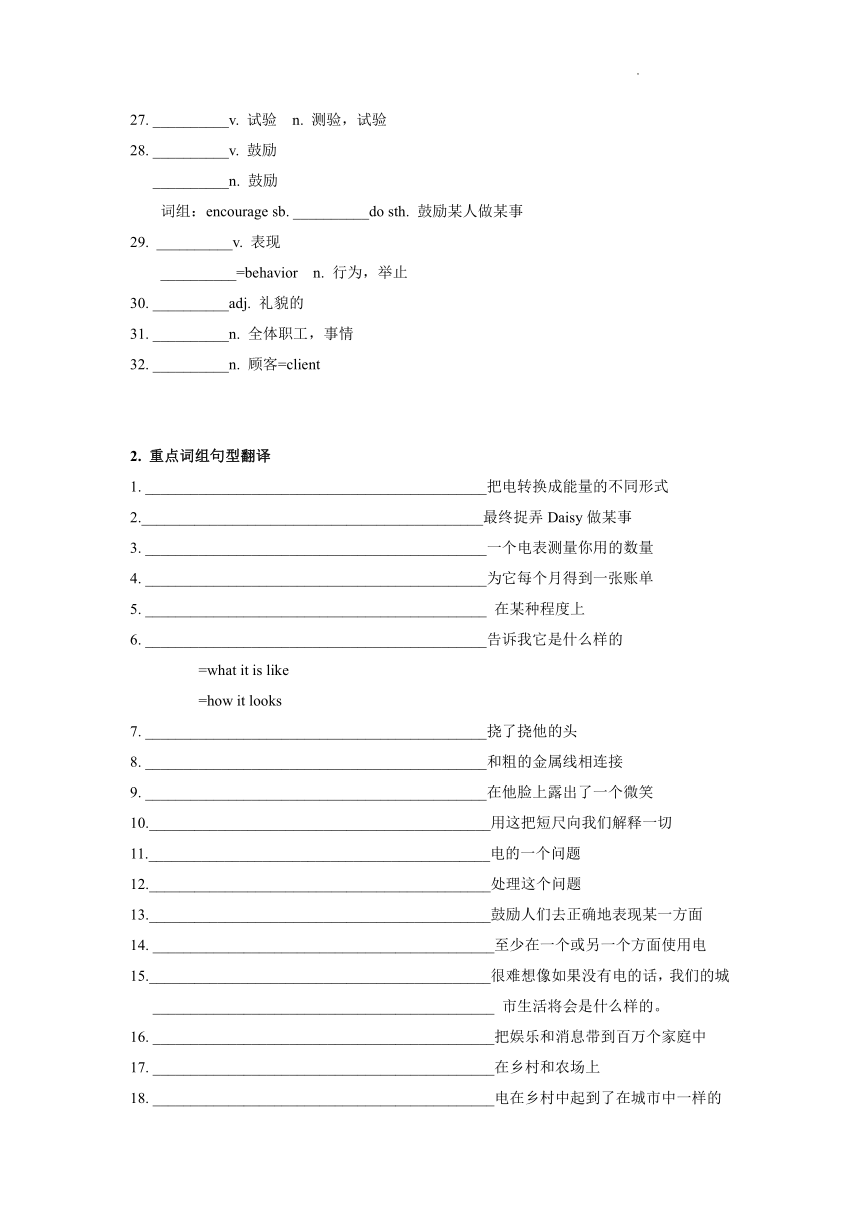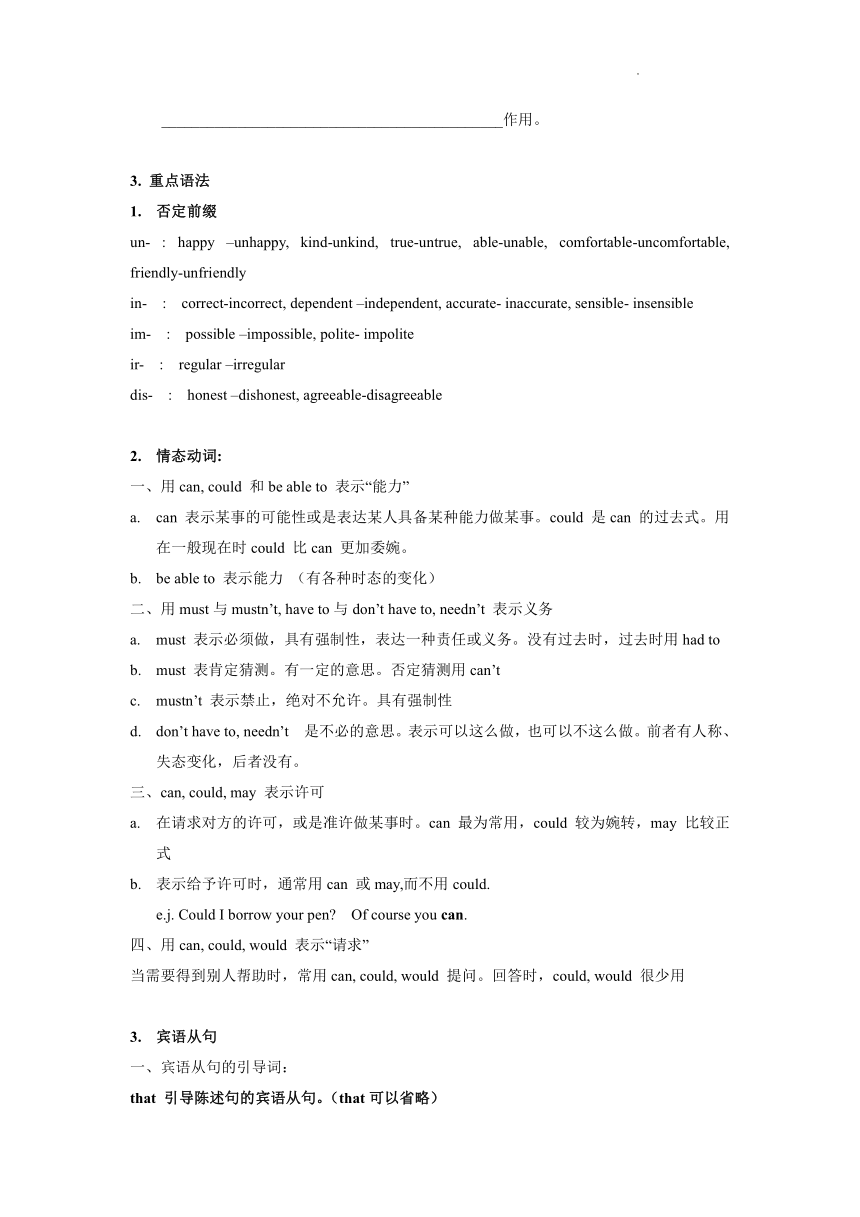Module 1 Nature and environment Unit 3 Electricity知识点复习(含答案)2021-2022学年牛津上海版英语八年级下册
文档属性
| 名称 | Module 1 Nature and environment Unit 3 Electricity知识点复习(含答案)2021-2022学年牛津上海版英语八年级下册 |

|
|
| 格式 | doc | ||
| 文件大小 | 58.8KB | ||
| 资源类型 | 教案 | ||
| 版本资源 | 牛津上海版(试用本) | ||
| 科目 | 英语 | ||
| 更新时间 | 2022-04-12 08:28:09 | ||
图片预览




文档简介
8BU3知识点复习
重点词汇词组梳理
__________ n. 仆人
__________ v. 为别人工作或服务
__________ n. 服务,协助,工作
__________ n. 电,电能
__________ adj. 用电力工作的,电动的
__________ adj. 用电的,使用电力的
__________ adj. 电子元器件的,电子的
__________ v. 哄骗 n. 诡计,花招
词组:__________a __________ __________sb. 捉弄某人
__________adj. 愚蠢的
__________n. 傻瓜,愚弄
__________adj. 聪明的,明智的
5. wire n. 金属丝,金属线
6. meter n. 计量器,计量表
词组:electricity meter 电表 water meter 水表
7. __________v. 测量,度量 n. 量度法,计量制 v. 高度、长度为。。。
e.j. The pool __________25m by 5 m 这个游泳池长25米,宽5米
__________n. 长度、宽度、高度等
8. bill n. 账单,钞票,币
9. __________adv. 每月一次 adj. 每月的 n. 月刊
10. __________a way 在某种程度上
__________this way 用这种方法
__________the way 顺便
__________the way to 在去……路上
__________ __________the way 让路
__________the way 挡道
__________n. 解释,说明
__________v. 解释
12. __________adj. 小心的,谨慎的
__________ adj. 粗心的
__________ adv. 小心地
__________ v. n. 关心
词组:be careful __________小心对待,谨慎处理
__________ __________喜欢,照顾= __________ __________
13. __________v. 挠,抓
14. __________adj. 看不见的,隐形的
__________ adj. 看的见的
bulb n. 电灯泡
light bulb 电灯
16. __________ to 连接,联结=__________ to
17. bury v. 埋藏 (buried, buried )
18. power station 发电厂,发电站
__________n. 力量
__________ adj. 有力量的
19. __________adv. 有礼貌地,客气地
__________ adj. 有礼貌的
__________ n. 礼貌
__________ adv. 无礼地,没规矩地
__________ adv. 粗鲁地
20. grin n. 露齿而笑 v. 咧嘴笑
21. __________ v. 包含,含有,容纳
__________n. 容器
__________ adj. 清楚的
__________ adv. 清晰地
23. iron n. 熨斗,铁 v. 熨烫
24. switch v. 开或关 n. 开关,电键
25. off adv. 不连接,不工作 turn off, switch off, get off, put off, take off
词组 __________off 关 =__________off
__________on =__________on put on,
26. __________v. 锁上 n. 锁
27. __________v. 试验 n. 测验,试验
28. __________v. 鼓励
__________n. 鼓励
词组:encourage sb. __________do sth. 鼓励某人做某事
__________v. 表现
__________=behavior n. 行为,举止
30. __________adj. 礼貌的
31. __________n. 全体职工,事情
32. __________n. 顾客=client
重点词组句型翻译
1. _____________________________________________把电转换成能量的不同形式
2._____________________________________________最终捉弄Daisy做某事
3. _____________________________________________一个电表测量你用的数量
4. _____________________________________________为它每个月得到一张账单
5. _____________________________________________ 在某种程度上
6. _____________________________________________告诉我它是什么样的
=what it is like
=how it looks
7. _____________________________________________挠了挠他的头
8. _____________________________________________和粗的金属线相连接
9. _____________________________________________在他脸上露出了一个微笑
10._____________________________________________用这把短尺向我们解释一切
11._____________________________________________电的一个问题
12._____________________________________________处理这个问题
13._____________________________________________鼓励人们去正确地表现某一方面
14. _____________________________________________至少在一个或另一个方面使用电
15._____________________________________________很难想像如果没有电的话,我们的城
_____________________________________________ 市生活将会是什么样的。
16. _____________________________________________把娱乐和消息带到百万个家庭中
17. _____________________________________________在乡村和农场上
18. _____________________________________________电在乡村中起到了在城市中一样的
_____________________________________________作用。
重点语法
否定前缀
un- : happy –unhappy, kind-unkind, true-untrue, able-unable, comfortable-uncomfortable, friendly-unfriendly
in- : correct-incorrect, dependent –independent, accurate- inaccurate, sensible- insensible
im- : possible –impossible, polite- impolite
ir- : regular –irregular
dis- : honest –dishonest, agreeable-disagreeable
情态动词:
用can, could 和be able to 表示“能力”
can 表示某事的可能性或是表达某人具备某种能力做某事。could 是can 的过去式。用在一般现在时could 比can 更加委婉。
be able to 表示能力 (有各种时态的变化)
用must与mustn’t, have to与don’t have to, needn’t 表示义务
must 表示必须做,具有强制性,表达一种责任或义务。没有过去时,过去时用had to
must 表肯定猜测。有一定的意思。否定猜测用can’t
mustn’t 表示禁止,绝对不允许。具有强制性
don’t have to, needn’t 是不必的意思。表示可以这么做,也可以不这么做。前者有人称、失态变化,后者没有。
can, could, may 表示许可
在请求对方的许可,或是准许做某事时。can 最为常用,could 较为婉转,may 比较正式
表示给予许可时,通常用can 或may,而不用could.
e.j. Could I borrow your pen Of course you can.
四、用can, could, would 表示“请求”
当需要得到别人帮助时,常用can, could, would 提问。回答时,could, would 很少用
宾语从句
宾语从句的引导词:
that 引导陈述句的宾语从句。(that可以省略)
that 不可以省略的情况:
主从句之间有插入语时。 e.j. It says here, on this card, that it was used in plays.
从句中的主语是that 时。 e.j. He thinks that that is a washing machine.
若出现两个或两个以上的宾语从句,且由并列连词连接时,只有第一个引导词可以省略。e.j. My aunt says (that) she will come and that she will also bring her daughter.
if, whether 引导一般疑问句的宾语从句。(不可以省略)
其他特殊疑问词引导其提问的特殊疑问句的宾语从句
宾语从句的否定转移及反意疑问句
主句的谓语动词是:think, believe, imagine, suppose, guess 等,并且主句的主语是第一人称而且为一般现在时,从句的否定词一般要转移到主句中来,其反意疑问句一般对应宾语从句。
e.j. I don’t think he will come to the party.
如果宾语从句的主句非第一人称,反意疑问句要与主句一致。主从句中的否定全部算否定,反意疑问句要用肯定形式。
e.j. We find that he never listens to the teacher carefully, does he
☆无需改变语序的宾语从句:
当特殊疑问词充当宾语从句的主语时,宾语从句部分的语序与其特殊疑问句语序一致。
e.j. Can you tell me who is the group leader
I don’t know what makes him so sick.
宾语从句若为what’s the matter/ the problem / wrong 等表示询问存在某些问题的句子时,语序也不需变化。
e.j. Please tell me what’s wrong with you.
Do you know what’s the matter with my watch
宾语从句的时态:
主句为一般现在时,从句为:一般现在时,一般过去时,现在进行时,现在完成时,一般将来时
主句为一般过去时,从句为:一般过去时,过去完成时,过去进行时,过去完成时,过去将来时
注意:当从句为客观真理时,无论主句是什么时态,从句均用一般现在时。
8B U3 Exercise (提高版)
单选题
1.You get a bill ________ water, gas, electricity every month.( )
A.for B.on C.with D.about
2."Has _________ ever seen electricity?" Ben asked his Dad.( )
A.somebody B.anybody C.nobody D.no one
3.- Will you please bring me some sweets ?
- ____.( )
A.That's too heavy. B.It's a pleasure.
C.It doesn't matter. D.All right.
4.There is going to _________ a concert tomorrow afternoon.( )
A.be B. have C.is D.has
5.I believe that what he says is partly true. The underlined part means ____.( )
A.on the way B.in a way C.in this way D.by the way
6.Water changes _________ ice when it is very cold.( )
A.into B.in C.for D.to
7.At home, children must _______ fire without an adult.( )
A.be careful B.be careful with
C.careful with D.be careful of
8. --____ I have a look at your new pencil-box?
--Yes, you _____.( )
A.May; must B.May; may C.Must; can D.Can; must
9.Do you know _____?( )
A.where does water come from
B.how do we make electricity
C.who's looking foolish now
D.why is there grin on his face
10.You've just had lunch. You ____ be hungry now.( )
A.can't B.mustn't C.may not D.must
11.She doesn't understand this passage ____ there are few new words in it.( )
A.because B.if C.since D.though
12.Her success encouraged me ____ the same thing.( )
A.try B.to try C.trying D.tried
13.Drivers should be responsible ____ their passengers' safety.( )
A.of B.over C.for D.to
14.Don't dig here. These thin wires ____ thick wires that are buried under the street.( )
A.are connected to B.are connected at
C.connected to D.connected with
15.Please ____ the lights when you leave the room.( )
A.switch on B.switch off C.put on D.put off
词性转换
"May I have my packet of electricity?" Benny said __________.(polite)
The famous writer __________two years ago.(dead)
The farmers used __________ to kill the insects in their fields.(chemistry)
Taxi __________ are developing quickly in Shanghai.(serve)
There's thunder and __________ (light). It's going to rain.
He has no __________ (explain) for why he was late.
Miss Wang is our __________ teacher. (chemist)
Modern Family is a popular __________ magazine. (month)
Don't always do such __________ things. (fool)
My grandmother usually uses the __________ kettle to boil water.(electricity)
We should save electricity by using fewer__________ appliances.(electricity)
句型转换
The boy looks like a fool. (就划线部分提问)
_________ _________ the boy look ________
To finish the work is very difficult.(保持句意基本不变)
_____________ very difficult _____________ finish the work.
The size of your sports shoes is not the same as mine. I can't wear them. (保持原句意思)
The size of your sports shoes is_____________ ____________ mine. I can't wear them.
Where does electricity come from? Do you know? (宾语从句)
Do you know ____________ electricity ____________ from?
Is the woman our new teacher? I want to know.. (宾语从句)
I ____________ ____________the woman is our new teacher.
首字母训练
It was six o‘clock in the evening. The visitors had left the museum. Jose, head of art division (部门), was walking around, checking to see that e___1____ was all right. Suddenly, Jose saw something on the floor. What do you think he saw He saw a beautiful painting lying there. Jose s___2____ the painting to the director of the museum.
“Let‘s call several museums to check and see i____3___ it‘s a stolen painting.” said the director.
No one knew the painting, so the director decided to hang it up in the art division. All the experts came to see the p___4____. Each one said it was beautiful and had very deep meaning. The director was very happy to have such a wonderful painting in his museum.
Several weeks later, a woman came to the museum w___5___ her five-year-old son. While they were looking at the new painting, the little boy began to cry. The director came over to the child and said:“Why are you crying ”
The child pointed to the painting and said:“I‘m crying because that‘s my painting on the wall, and I want it b___6____.”
“Yes,” said his mother, “I was here with Danny a few weeks ago, and he left his painting right here on the floor. If you look c___7____, you can see his name.” The director looked at the boy and his mother uncomfortably. He did not know what to say.
重点词汇词组梳理
__________ n. 仆人
__________ v. 为别人工作或服务
__________ n. 服务,协助,工作
__________ n. 电,电能
__________ adj. 用电力工作的,电动的
__________ adj. 用电的,使用电力的
__________ adj. 电子元器件的,电子的
__________ v. 哄骗 n. 诡计,花招
词组:__________a __________ __________sb. 捉弄某人
__________adj. 愚蠢的
__________n. 傻瓜,愚弄
__________adj. 聪明的,明智的
5. wire n. 金属丝,金属线
6. meter n. 计量器,计量表
词组:electricity meter 电表 water meter 水表
7. __________v. 测量,度量 n. 量度法,计量制 v. 高度、长度为。。。
e.j. The pool __________25m by 5 m 这个游泳池长25米,宽5米
__________n. 长度、宽度、高度等
8. bill n. 账单,钞票,币
9. __________adv. 每月一次 adj. 每月的 n. 月刊
10. __________a way 在某种程度上
__________this way 用这种方法
__________the way 顺便
__________the way to 在去……路上
__________ __________the way 让路
__________the way 挡道
__________n. 解释,说明
__________v. 解释
12. __________adj. 小心的,谨慎的
__________ adj. 粗心的
__________ adv. 小心地
__________ v. n. 关心
词组:be careful __________小心对待,谨慎处理
__________ __________喜欢,照顾= __________ __________
13. __________v. 挠,抓
14. __________adj. 看不见的,隐形的
__________ adj. 看的见的
bulb n. 电灯泡
light bulb 电灯
16. __________ to 连接,联结=__________ to
17. bury v. 埋藏 (buried, buried )
18. power station 发电厂,发电站
__________n. 力量
__________ adj. 有力量的
19. __________adv. 有礼貌地,客气地
__________ adj. 有礼貌的
__________ n. 礼貌
__________ adv. 无礼地,没规矩地
__________ adv. 粗鲁地
20. grin n. 露齿而笑 v. 咧嘴笑
21. __________ v. 包含,含有,容纳
__________n. 容器
__________ adj. 清楚的
__________ adv. 清晰地
23. iron n. 熨斗,铁 v. 熨烫
24. switch v. 开或关 n. 开关,电键
25. off adv. 不连接,不工作 turn off, switch off, get off, put off, take off
词组 __________off 关 =__________off
__________on =__________on put on,
26. __________v. 锁上 n. 锁
27. __________v. 试验 n. 测验,试验
28. __________v. 鼓励
__________n. 鼓励
词组:encourage sb. __________do sth. 鼓励某人做某事
__________v. 表现
__________=behavior n. 行为,举止
30. __________adj. 礼貌的
31. __________n. 全体职工,事情
32. __________n. 顾客=client
重点词组句型翻译
1. _____________________________________________把电转换成能量的不同形式
2._____________________________________________最终捉弄Daisy做某事
3. _____________________________________________一个电表测量你用的数量
4. _____________________________________________为它每个月得到一张账单
5. _____________________________________________ 在某种程度上
6. _____________________________________________告诉我它是什么样的
=what it is like
=how it looks
7. _____________________________________________挠了挠他的头
8. _____________________________________________和粗的金属线相连接
9. _____________________________________________在他脸上露出了一个微笑
10._____________________________________________用这把短尺向我们解释一切
11._____________________________________________电的一个问题
12._____________________________________________处理这个问题
13._____________________________________________鼓励人们去正确地表现某一方面
14. _____________________________________________至少在一个或另一个方面使用电
15._____________________________________________很难想像如果没有电的话,我们的城
_____________________________________________ 市生活将会是什么样的。
16. _____________________________________________把娱乐和消息带到百万个家庭中
17. _____________________________________________在乡村和农场上
18. _____________________________________________电在乡村中起到了在城市中一样的
_____________________________________________作用。
重点语法
否定前缀
un- : happy –unhappy, kind-unkind, true-untrue, able-unable, comfortable-uncomfortable, friendly-unfriendly
in- : correct-incorrect, dependent –independent, accurate- inaccurate, sensible- insensible
im- : possible –impossible, polite- impolite
ir- : regular –irregular
dis- : honest –dishonest, agreeable-disagreeable
情态动词:
用can, could 和be able to 表示“能力”
can 表示某事的可能性或是表达某人具备某种能力做某事。could 是can 的过去式。用在一般现在时could 比can 更加委婉。
be able to 表示能力 (有各种时态的变化)
用must与mustn’t, have to与don’t have to, needn’t 表示义务
must 表示必须做,具有强制性,表达一种责任或义务。没有过去时,过去时用had to
must 表肯定猜测。有一定的意思。否定猜测用can’t
mustn’t 表示禁止,绝对不允许。具有强制性
don’t have to, needn’t 是不必的意思。表示可以这么做,也可以不这么做。前者有人称、失态变化,后者没有。
can, could, may 表示许可
在请求对方的许可,或是准许做某事时。can 最为常用,could 较为婉转,may 比较正式
表示给予许可时,通常用can 或may,而不用could.
e.j. Could I borrow your pen Of course you can.
四、用can, could, would 表示“请求”
当需要得到别人帮助时,常用can, could, would 提问。回答时,could, would 很少用
宾语从句
宾语从句的引导词:
that 引导陈述句的宾语从句。(that可以省略)
that 不可以省略的情况:
主从句之间有插入语时。 e.j. It says here, on this card, that it was used in plays.
从句中的主语是that 时。 e.j. He thinks that that is a washing machine.
若出现两个或两个以上的宾语从句,且由并列连词连接时,只有第一个引导词可以省略。e.j. My aunt says (that) she will come and that she will also bring her daughter.
if, whether 引导一般疑问句的宾语从句。(不可以省略)
其他特殊疑问词引导其提问的特殊疑问句的宾语从句
宾语从句的否定转移及反意疑问句
主句的谓语动词是:think, believe, imagine, suppose, guess 等,并且主句的主语是第一人称而且为一般现在时,从句的否定词一般要转移到主句中来,其反意疑问句一般对应宾语从句。
e.j. I don’t think he will come to the party.
如果宾语从句的主句非第一人称,反意疑问句要与主句一致。主从句中的否定全部算否定,反意疑问句要用肯定形式。
e.j. We find that he never listens to the teacher carefully, does he
☆无需改变语序的宾语从句:
当特殊疑问词充当宾语从句的主语时,宾语从句部分的语序与其特殊疑问句语序一致。
e.j. Can you tell me who is the group leader
I don’t know what makes him so sick.
宾语从句若为what’s the matter/ the problem / wrong 等表示询问存在某些问题的句子时,语序也不需变化。
e.j. Please tell me what’s wrong with you.
Do you know what’s the matter with my watch
宾语从句的时态:
主句为一般现在时,从句为:一般现在时,一般过去时,现在进行时,现在完成时,一般将来时
主句为一般过去时,从句为:一般过去时,过去完成时,过去进行时,过去完成时,过去将来时
注意:当从句为客观真理时,无论主句是什么时态,从句均用一般现在时。
8B U3 Exercise (提高版)
单选题
1.You get a bill ________ water, gas, electricity every month.( )
A.for B.on C.with D.about
2."Has _________ ever seen electricity?" Ben asked his Dad.( )
A.somebody B.anybody C.nobody D.no one
3.- Will you please bring me some sweets ?
- ____.( )
A.That's too heavy. B.It's a pleasure.
C.It doesn't matter. D.All right.
4.There is going to _________ a concert tomorrow afternoon.( )
A.be B. have C.is D.has
5.I believe that what he says is partly true. The underlined part means ____.( )
A.on the way B.in a way C.in this way D.by the way
6.Water changes _________ ice when it is very cold.( )
A.into B.in C.for D.to
7.At home, children must _______ fire without an adult.( )
A.be careful B.be careful with
C.careful with D.be careful of
8. --____ I have a look at your new pencil-box?
--Yes, you _____.( )
A.May; must B.May; may C.Must; can D.Can; must
9.Do you know _____?( )
A.where does water come from
B.how do we make electricity
C.who's looking foolish now
D.why is there grin on his face
10.You've just had lunch. You ____ be hungry now.( )
A.can't B.mustn't C.may not D.must
11.She doesn't understand this passage ____ there are few new words in it.( )
A.because B.if C.since D.though
12.Her success encouraged me ____ the same thing.( )
A.try B.to try C.trying D.tried
13.Drivers should be responsible ____ their passengers' safety.( )
A.of B.over C.for D.to
14.Don't dig here. These thin wires ____ thick wires that are buried under the street.( )
A.are connected to B.are connected at
C.connected to D.connected with
15.Please ____ the lights when you leave the room.( )
A.switch on B.switch off C.put on D.put off
词性转换
"May I have my packet of electricity?" Benny said __________.(polite)
The famous writer __________two years ago.(dead)
The farmers used __________ to kill the insects in their fields.(chemistry)
Taxi __________ are developing quickly in Shanghai.(serve)
There's thunder and __________ (light). It's going to rain.
He has no __________ (explain) for why he was late.
Miss Wang is our __________ teacher. (chemist)
Modern Family is a popular __________ magazine. (month)
Don't always do such __________ things. (fool)
My grandmother usually uses the __________ kettle to boil water.(electricity)
We should save electricity by using fewer__________ appliances.(electricity)
句型转换
The boy looks like a fool. (就划线部分提问)
_________ _________ the boy look ________
To finish the work is very difficult.(保持句意基本不变)
_____________ very difficult _____________ finish the work.
The size of your sports shoes is not the same as mine. I can't wear them. (保持原句意思)
The size of your sports shoes is_____________ ____________ mine. I can't wear them.
Where does electricity come from? Do you know? (宾语从句)
Do you know ____________ electricity ____________ from?
Is the woman our new teacher? I want to know.. (宾语从句)
I ____________ ____________the woman is our new teacher.
首字母训练
It was six o‘clock in the evening. The visitors had left the museum. Jose, head of art division (部门), was walking around, checking to see that e___1____ was all right. Suddenly, Jose saw something on the floor. What do you think he saw He saw a beautiful painting lying there. Jose s___2____ the painting to the director of the museum.
“Let‘s call several museums to check and see i____3___ it‘s a stolen painting.” said the director.
No one knew the painting, so the director decided to hang it up in the art division. All the experts came to see the p___4____. Each one said it was beautiful and had very deep meaning. The director was very happy to have such a wonderful painting in his museum.
Several weeks later, a woman came to the museum w___5___ her five-year-old son. While they were looking at the new painting, the little boy began to cry. The director came over to the child and said:“Why are you crying ”
The child pointed to the painting and said:“I‘m crying because that‘s my painting on the wall, and I want it b___6____.”
“Yes,” said his mother, “I was here with Danny a few weeks ago, and he left his painting right here on the floor. If you look c___7____, you can see his name.” The director looked at the boy and his mother uncomfortably. He did not know what to say.
